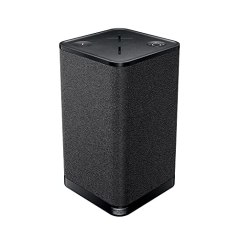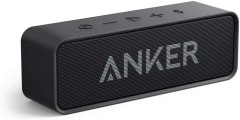BestReviews is reader-supported and may earn an affiliate commission. Details


Excellent sound with deep booming base and intuitive pairing capabilities made this a favorite of our team during trials.
Impressively loud, yet clear sound that we found to maintain quality even at the highest volume. We particularly loved how it provided 360 degrees of sound making it the perfect party companion. Has 24 hours of battery life before needing a charge. Splash-proof.
We wish the charger was more compact or utilized USB-C.


If the ability to play over 500 songs in a single charge grabs your attention, the slim design and distortion-free audio of the Anker SoundCore will seal the deal.
Incredible 24 hours of play time per charge. Balanced audio quality, even at high volumes. Clean bass sound. Drop-proof design. Three colors available. Lightweight. Affordable.
This speaker is not waterproof. It doesn’t come with the convenience of a built-in travel clip or strap. No companion app.


This attractive portable speaker packs booming sound in a compact, carry-anywhere design.
Certified IPX7 waterproof. Wireless Bluetooth streaming. Outputs 20 watts, and features USB-C quick-charge connectivity. Strong bass. Lasts up to 12 hours per charge. Comes in multiple colors to match your style.
Convenient charging base sold separately.


Versatile and durable speaker designed to offer powerful sound both at home and on the move.
Impressive sound clarity and depth; automatically adjusts to surroundings. Features WiFi and Bluetooth connectivity. Ruggedly constructed; resists drops and water. Control directly from device, via app, or by voice.
Only offered in black or white. 10-hour battery life is decent, but lacking compared to competitors.


More stores
Crutchfield
This speaker from JBL's CHARGE line features hip styling and outstanding audio performance.
Rated IP67 dustproof and waterproof. USB-C and USB-A connections. Offers a wide soundstage with excellent fidelity and power. Syncs to other current JBL speakers. Charges other devices.
Does not sync to older CHARGE models.

We recommend these products based on an intensive research process that's designed to cut through the noise and find the top products in this space. Guided by experts, we spend hours looking into the factors that matter, to bring you these selections.



Playing music from the small speakers on your phone isn’t the most satisfying experience when you’re enjoying a summer outing, but a portable speaker can pack a punch and give your music the rich sound it deserves.
Portable speakers connect to your devices via an auxiliary cable, Bluetooth, or both. Speakers that connect to your device with a cable limit your movement, but there’s no setup required beyond plugging in your device. Bluetooth can take some time to set up, but it allows you to keep your phone in your pocket and put your speaker nearby. The battery life and durability of portable speakers vary, so you should check the specifications to find the right speaker for your outdoor adventures.
Portable speakers range greatly in price, and some high-performance models can be something of an investment.


The main differences between portable speakers are connectivity and sound. Connecting your device should be straightforward and convenient, and the speaker should produce enough volume to carry a short distance outdoors.
While most of today’s portable speakers connect to devices via Bluetooth, many still include an auxiliary cable, and some use near-field communication. Many portable speakers include both Bluetooth and an auxiliary cable, which is great if several people want to play music from their devices and some have Bluetooth while others have a headphone jack.
Bluetooth: A wireless connection allows you to wander about 30 feet from your speaker, but the signal may falter as you get farther away or obstacles come between you and the speaker. Setting up a Bluetooth connection requires you to put your speaker in “pairing” mode and use your phone to search for the signal. Though Bluetooth is great when it’s working, it can be finicky, and setting up that initial connection can be challenging. Once you’ve paired the devices, connecting in the future should be easier.
Auxiliary cable: You can plug some speakers directly into your devices through a headphone jack. If your phone has a jack, you should have no problem playing whatever media you like from your speaker. If not, you’ll have to get an adapter or opt for Bluetooth instead.
Finding specific specs of portable speakers can be difficult. The size of the speaker often corresponds to its volume and bass level. Your best bet is to read customer reviews of sound quality for the speaker you’re considering to find out how well the speaker handles highs, lows, and mids. Outdoor speakers are designed to produce loud, high-quality sound, but they don’t have the power or range of a home stereo. You want a portable speaker with enough volume to fill an outdoor area despite wind or other ambient noise.
If the manufacturer does include tech specs, take note of the number of drivers and the combined wattage of the drivers. A speaker with a 5-watt driver is usually sufficiently loud for outdoor use, but some high-end models offer 60 watts or more.








































Portable speakers vary in form, durability, and controls. Though most portable speakers are fairly straightforward devices, there are still several features to consider while you shop.
Portable speakers range from compact devices you can slip in a pocket to large speakers that deliver impressive sound. Choosing the right sound means considering your volume needs and whether you’ll use the speaker primarily in your backyard or a larger area. A large speaker can be difficult to transport, but a smaller speaker may not deliver the sound you need.
Portable speakers may be squat discs, tall cylinders, or long bricks. If you plan to carry your speaker in your backpack, you’ll want a compact shape that packs well with your other gear.
Rechargeable lithium-ion batteries are common in portable speakers, but the time it takes to recharge them varies depending on the speaker. If you plan to use your speaker in remote locations far away from outlets, be sure to choose a model with sufficient battery life. Some of the most robust speakers boast up to 36 hours of battery life, while other models can only run for a couple of hours.
Some models also have USB ports, allowing you to charge other devices with the speaker’s battery. This can be incredibly useful while camping or hiking.
Some portable speakers are designed to be shockproof and/or waterproof. Highly durable models tend to be more expensive, but if you want to take your music with you as you battle the elements, a durable portable speaker is a must.
Some portable speakers can connect to your home WiFi network, which typically has a greater range than a device’s Bluetooth signal. Since we’re talking about portable speaker here, this is a secondary consideration, but the ability to easily use your speaker at home can be convenient.
Volume: Most speakers have volume control built in, so you can easily adjust the volume via buttons on the speaker itself. In some cases, a speaker may have a built-in touchscreen for controlling the volume and other settings. Some models allow you to adjust the volume via your device or the speaker itself.


Basic portable speakers that cost from $10 to $20 are generally small in size and lack the power of larger speakers. However, durable waterproof speakers are available in this price range, and Bluetooth connectivity is common.
Between $20 and $50 you’ll find a variety of portable speakers that range from compact, rugged models to larger speakers with rich, powerful sound. Features like voice commands and USB charging are common at the higher end of this range.
High-end portable speakers that cost $50 to $200 are usually fairly large and offer sound comparable to that of basic stereo systems. If you need speakers equipped for a larger outdoor gathering, this price range is your best option.
Bluetooth is incredibly convenient when it’s working, but when it isn’t, it can be a headache. Here are some tips for getting the connection up and running.
Turn it off and on again. This classic tip can do wonders, and it goes for both the speaker and your device. Turning off the Bluetooth on your phone and turning it on again can also help.
Make sure your speaker is in pairing mode. Do this before trying to establish a connection.
Remove other devices from the area. Limit the number of other devices around the speaker or between your device and the speaker.
Check for compatibility. Double-check the Bluetooth versions of both your device and your speaker.


A. That depends on the model, but some more expensive speakers allow you to adjust the sound settings.
A. Some speakers have this feature, but this isn’t always the case. The speakers usually have to be from the same brand.
A. Most portable speakers allow you to charge the speaker while it plays music.
Get emails you’ll love.
Learn about the products you’re wondering if you should buy and get advice on using your latest purchases.
